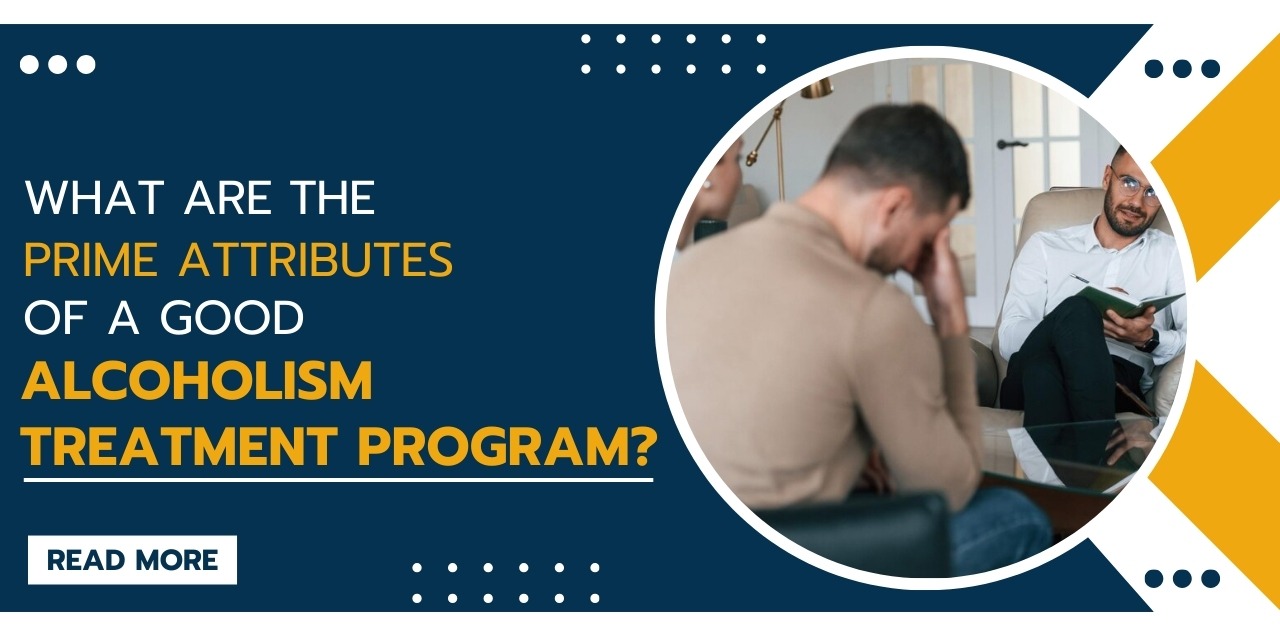What are the prime attributes of a good alcoholism treatment program?


Alcoholism treatment program, often known as alcohol use disorder (AUD) plan, is essentially a medical illness in which a person is unable to limit their alcohol usage despite the negative effects. It is considered a form of substance use disorder and is marked by a pattern of excessive and compulsive alcohol use that can have a detrimental impact on an individual’s physical health, mental well-being, relationships, and overall quality of life. Alcoholism treatment encompasses a combination of therapies, counseling, medications (such as those that reduce cravings or address withdrawal symptoms), and support from healthcare professionals and support groups to combat the problem of alcoholism.

A successful alcoholism treatment program typically incorporates a wide array of practices such as behavioral therapy, medication, detoxification, supportive counseling, etc to effectively address the complex issues associated with alcohol addiction. The best alcoholism treatment plans are designed to meet the specific needs of individual seeking for help.
There should be in-depth analysis of the physical, social and psychological need of a person so that the right plan can be designed as per the severity of the problem. This also helps to determine the appropriate level of care and treatment modalities. Only once the problem and its underlying causes have been identified, the right course of action towards the problem can be established. Alcoholism programs need to be individualized, taking into account the person’s unique history, goals, and challenges. There isn’t any one-size-fits-all approach to treatment for alcoholism. For those with extreme alcohol dependence, there is a need for medically supervised detox process so that the withdrawal symptoms can be handled safely.
When you call our helpline, an admissions navigator is there to listen to you, answer any questions you have, and provide the support that you need—all 100% confidentially.
There are various alcoholism treatment plans and approaches available to individuals seeking help for alcohol addiction. The kind of treatment you select depends on unique needs, severity of addiction, and preferences of the patient. Some of the treatment plans available to patients suffering from alcoholism have been mentioned below:

Cognitive-Behavioral Therapy – • Cognitive-Behavioral Therapy- This is used to take care of the psychological aspect of the alcoholism problem. CBT helps individuals identify specific situations, emotions, or thoughts that trigger their desire to drink. Understanding these triggers is a crucial step in developing strategies to manage and cope with them. In some cases, medications like naltrexone, or disulfiramcan be prescribed so as to help minimize cravings and avoid relapse. Individual and group counseling sessions provide a safe space for individuals to explore the underlying issues contributing to their addiction, learn coping skills, and build a support network.
The best alcoholism treatment engages the family in the treatment process. This improves communication, addresses family dynamics and helps set up a support system for the person seeking treatment.
Dialectical Behavioral Therapy –
One of the core components of DBT is emotion regulation. Individuals with alcohol addiction often struggle with managing intense and overwhelming emotions, which can trigger alcohol use. DBT teaches individuals how to identify, understand, and effectively manage their emotions without turning to alcohol as a coping mechanism. People recovering from alcohol addiction may encounter stressful and triggering situations that can increase the risk of relapse. DBT equips individuals with distress tolerance skills, helping them learn to tolerate and manage distressing emotions and situations without resorting to alcohol.
12-Step Program For Addiction –
We’ll instantly check the coverage offered by your insurance provider.
Alcoholism treatment plan have several benefits. These benefits accrue not only for the individuals battling addiction, but also for their families as well as community at large. These benefits are not only physical but also psychological, social, and emotional. The main aim of treatment is to aid addicts achieve as well as maintain sobriety.

The treatment plan even addresses other co-occurring mental health disorders like depression and anxiety. Treating co-occurring mental health disorders can significantly improve overall well-being and reduce the risk of relapse. Improving mental well-being is a significant benefit of treatment. Alcohol addiction can be financially draining due to the cost of alcohol and related consequences. Sobriety can lead to improved financial stability. The advantages of the alcoholism treatment plan can differ from person to person. To what extent the programs successful depends on commitment and devotion of the individual towards convalescence.
Ultimately, successful completion of an alcohol treatment plan can lead to a better quality of life. Individuals may experience improved relationships, increased productivity, better physical health, and a sense of purpose and fulfillment.
It is important to note that the effectiveness of the best alcoholism treatment program depends not only on how the program is structured and what are its components but also on the individual’s commitment, motivation, and active participation in their recovery process. Successful treatment often involves ongoing support and a focus on long-term sobriety and well-being. The steadfastness and dedication of the individual to keep the problem at bay cannot be less emphasized. It is of paramount importance in maintaining sobriety.